- Home
- Catherine Anderson
The Christmas Room Page 2
The Christmas Room Read online
Page 2
“Only half. My mom’s Irish.”
Kirstin’s father was a Scot, and he was the most stubborn, irascible man she’d ever known. He hadn’t always been that way, though. The death of her mother six years earlier had changed him. “Well, half Scottish or not, you seem nice.”
He chuckled. “I take it you have a low opinion of Scots.”
“Not really. Just a difficult experience with one in particular.” She took a sip of her drink. “So, Cameron McLendon, tell me about yourself.”
He smiled. “Boring story.”
“So is mine, I’m afraid, but to get acquainted, we have to start somewhere, and I asked first.”
He chuckled. “Want me to get two toothpicks so you can prop your eyelids open?” He followed the question with a sigh. “Okay, here goes. I got a job opportunity with Long Barrel Ranches, and I’ve wanted to live here or in northern Idaho most of my adult life. It was finally my chance to chase my dreams, so I took the position.”
“I’m not bored yet. Keep talking.”
He shrugged. “For a long time, my dreams took second seat to my responsibilities, and I got stuck in Northern California. It’s not that I dislike California, but after a couple of trips to this area, I fell in love. I kept hoping I might settle here, but life kept throwing me curveballs.”
“Still interesting. What kind of curveballs?”
“It’s kind of personal to share with a stranger.”
Kirstin huffed. “Oh, boy. You haven’t been in the valley long enough. No one can keep a secret here. You may as well spill your guts.”
“I guess it’s not that personal.” He shrugged. “I got my girlfriend pregnant in high school.”
“Uh-oh. I’m not sure that qualifies as a curveball. More like a demolition ball.”
He paused to search her gaze, his expression conveying a mixture of surprise and appreciation. “Most people just say ‘tough luck’ and then move on to more interesting subjects.”
Kirstin had met individuals who skimmed only the surface with her in conversations. When she told people about a life-altering event and they barely acknowledged her comment, she felt unimportant if not invisible. It also hinted that the other person had little emotional depth. “It was tough luck, I suppose, but the ramifications go well beyond that and probably lasted for years.”
His cheek creased again in a suppressed smile. “Voice of experience?”
She shook her head. “No. I lived a very sheltered life in high school.” She wanted to add that she still lived a sheltered experience, but that would shift the conversation to her, and her own life bored her to tears. “I did have a friend who got pregnant, though. She kept the baby, and her future was totally steered off course.” She popped a green olive in her mouth. “So what happened? After you learned of the pregnancy, I mean.”
He took a sip of his drink. “Well, it didn’t demolish my life, but it did drastically alter it. My dad insisted that I marry her.”
“At seventeen?” If Kirstin ever had kids, which seemed more unlikely with each passing year, she’d never force her son or daughter to get married that young. “That must have been a recipe for disaster.”
“Pretty much. Our feelings for each other—or at least hers—weren’t strong enough to withstand the trials of a teen pregnancy, and she filed for divorce before the baby was born. I think it was the shortest marriage on record.” He shrugged. “Not all her fault, not entirely mine, either. She wanted to put our child up for adoption, but my parents helped me get custody. Right after she had the baby, she faded from the picture completely. No phone calls, no visitations. But even so, she refused to give up her parental rights. That ended up being a mess when I tried to get authorization from her to move my son out of state. She wouldn’t cooperate. I think that, for whatever reason, she still holds a grudge against me. I’m not sure for what. Both of us were just kids.”
Kirstin nodded. “At that point she should have turned loose of it. But apparently she didn’t, and without her authorization to relocate, you were screwed.”
“Pretty much stuck in California, for sure. And then, about five years ago, my dad was diagnosed with stage-four colon cancer.”
She glimpsed a shimmer of moisture in his eyes and felt a burn in her own. She knew how devastating it was to lose a beloved parent to cancer. Kirstin would never forget the day her mother had been diagnosed. “That must have been rough.”
“Three years of rough. He was stubborn and didn’t give up easily. My mother, God bless her, stood by him and cared for him until the end. All during his illness, I lived and worked an hour and a half away. They had a gorgeous home in snow country, and when a storm came during the winter, my first call of the day was to my folks to see how deep the white stuff was. Anything over three inches had me hauling ass north so I could clear their driveway, a necessity in case Mom had to call for an ambulance.” He shook his head. “As Dad’s illness worsened, her burdens increased, and my father needed moral support. What kind of son would have left them?”
Kirstin’s heart squeezed. Though his story differed from hers, she completely understood how he must have felt back then. “No siblings to help you out?”
“I’ve got an awesome older sister.” His eyes warmed with fondness. “She loves our parents as much as I do. But she’d gotten married before Dad got sick, has a family, lives on the East Coast, and has a challenging career. It was really hard on her when things got bad. She couldn’t come home for every rough spot in the road. Airline fares alone made that impossible. Our folks helped with her travel costs, but mostly she tried to come when she could spend quality time with them.”
“When her visits really counted.” Kirstin remembered how her own life had become centered on her parents during her mom’s illness. When she wasn’t needed to care for her mother, she’d been trying to comfort her father. “That must have been so awful for her, wanting to be there all the time and unable to be.”
“Exactly. She couldn’t just abandon her family and career to be around constantly. She did what she could. And at the end, even though she couldn’t catch a flight to get there before he died, she was there when it mattered most, to support me and Mom afterward.” He took a sip of his drink. “It was difficult for me. I won’t say it wasn’t, or that I didn’t feel resentful sometimes. I know she felt awful about it. But, hey, I’d chosen my path, mistake driven though it was, and that left me being the only kid on the ground to take care of our folks.”
Trish delivered their meals. Kirstin smiled when she saw that they’d both ordered wings. “Great minds think alike.” She eyed her basket of food and cringed. Eating chicken wings was messy and required no fewer than ten napkins to keep the sauce off her hands and face. For reasons she had no time to analyze right now, she wanted to be at her best as she got to know this guy. “This isn’t what I would have ordered if I’d known I’d be eating with you.”
He seemed to welcome the distraction, and Kirstin understood that. When she recalled her mother’s painful death, she felt as if her heart was being pushed through a meat grinder.
“Chow down,” he said. “If you smear sauce all over your face, I won’t hold it against you. Just do me the same favor.”
Kirstin grabbed a pile of table napkins and set it between them. “We have a deal. But don’t let good table manners take precedence over telling me the rest of your story.”
Around a bite of food, he said, “Only if you play fair and tell me yours.”
“I can do that.”
He frowned as if trying to remember what he’d been saying. “Anyway, my dad passed away almost two years ago. I think Mom was in shock the first year. Me too, I suppose. And my son took it really hard. Dad was our patriarch, the hub of our lives.” He took two of the napkins. “Last spring, when I got a chance to work for Long Barrel Ranches, selling exclusive agricultural or recreational properties, I really
wanted to grab the opportunity. Only I couldn’t leave my mother behind in Northern California. What family she has there is spread out over the state and up into Oregon. She had some friends, of course, but that isn’t the same as people who love you.”
“So she agreed to move here with you?” Kirstin guessed, dabbing the corners of her mouth.
“She said she was ready for a change so she wouldn’t constantly be reminded of Dad—their favorite restaurants, the trails they loved to walk, things like that. So I took my son before a judge. He was nearly sixteen. Caleb told the judge that he had never heard from his mom, that she had never even sent him a birthday card, and he didn’t think it was fair that he couldn’t move to Montana with me. The judge deemed Caleb to be old enough and mature enough to make that choice for himself. In a little over a week, I had permission to relocate my son. I put my farm on the market and came to the Bitterroot Valley to find a piece of land. Now we’re here on our property, essentially camping out while our residences are being built.”
Kirstin nearly choked as she swallowed. “Is your property on the river?”
He wiped his mouth. “Oh, yeah. We got so lucky. A large chunk of property with a lot of river frontage. Gorgeous piece of land. As rough as our living conditions are right now, even my mother loves it. Incredible three-hundred-and-sixty-degree views of the mountains. Fairly private. Good soil for alfalfa. The only problem is that Murphy’s Law reigned supreme this summer, slowing things down as far as construction went. We had to get septic system approval, and the county is especially careful about granting that on river property. The builder hasn’t even broken ground yet. He will soon, though.”
Kirstin collected her composure. “I think we’re neighbors. You’re the people with the—um—huge camp.”
Cam looked startled for a moment and then smiled. “Everyone who drives along Fox Hollow Road probably sees it. I think it’s become a conversation piece, with people speculating about what crazy thing I might do next. When you’re trying to create comfort for your family out in an alfalfa field, you have to be inventive. I’ve nicknamed it the Hillbilly Village.”
“I’m glad you have a sense of humor about it. My father says we’ve been invaded by the Clampetts.”
He threw back his tawny head and barked with laughter. She loved his broad smile. “Fair enough. I got everything in our camp functional, but I couldn’t make it pretty. We tried to rent a house, but no landlord would accept us. We have three dogs and six cats, not to mention horses.”
“We drive by your place going to and from town.” She fiddled with a crumpled napkin. “When I first saw you walk in, something about you seemed familiar. Now I know why. At a distance, I see you all the time. My father owns the ranch behind your property.”
Cam stared at her. “You’re Kirstin Conacher? Sam Conacher’s daughter?” He thumped himself on the forehead with the heel of his hand, leaving a smear of red sauce above his left eyebrow. “Oh, shit!”
Kirstin realized that he was already aware of her father’s reputation. “My dad isn’t as bad as rumor makes him out to be.” The moment she spoke, she knew she needed to make a retraction. “Well, he actually is pretty bad, but I’ve learned ways around him.”
• • •
Cam couldn’t believe his bad luck. He’d actually been thinking about asking Kirstie out on a date. Not happening. Rumor had it that Sam Conacher went way over the top when it came to protecting his daughter. Some people even said he could be violent, but Cam doubted that was true. Mostly the man just destroyed the reputation of any guy who was dumb enough to mess with her. Supposedly she didn’t date. He’d heard that she was beautiful, of course, but he had envisioned a spoiled, snotty rich girl with salon-conditioned hair and pampered skin. Kirstin Conacher didn’t fit that mold. Her nails were clipped short. Her hands, though small, looked strong and hardened from physical work. Her clothing was ordinary.
“Is it true that you’re still a virgin?” Cam wanted to kick himself the moment he asked the question.
She laughed. “Is that what people still say? No, definitely not, but only because I’ve been creative a few times, sneaking out behind my dad’s back.” She passed him a napkin. “Forehead. Right above your left eyebrow.” As Cam scrubbed his skin, she added, “I know sneaking out sounds absurd. I’m a grown woman and should just get a place of my own. But it’s more complicated than that.”
Cam saw sadness in her eyes, and her mouth drew into a pinched line. “Hey, if it’s something that’s hard for you to talk about, there’s no need to get into it. We didn’t sign a full-disclosure agreement, after all.”
“That wouldn’t be fair. Me sharing my details was part of the bargain. Besides, in some ways, our stories are alike. Six years ago we lost my mom to ovarian cancer, and I’m an only child. I had to carry the load, making sure she got her medicine on time and playing roulette with opiates when she couldn’t bear the pain. Convincing my father to put her in hospice was difficult. To him it was like giving up and signing her death warrant. I was nearly eighteen when we found out. She died when I was twenty. It was a terrible two years.”
Cam’s stomach knotted. He’d lived through times like that and knew how horrible they were. “I’m sure you made all the right choices.”
“I don’t know about that.” Her eyes glistened with unshed tears. She looked out the window instead of holding his gaze. Cam studied her profile. He thought it was perfect, featuring a short delicately bridged nose, lush lips, and a small chin that suggested she might have a stubborn streak. “I was so young. Death had always been something distant to me—an awful thing that would happen way off in the future. Only suddenly, there it was, taking my mom from us.” She took a bracing breath and looked back at Cam with a self-derisive smile. “Sorry. It’s been six years. One would think I’d be over it.”
“Do we ever really get over it?” Cam asked. “Two years, six years. That’s not long enough. Twenty maybe. And then it’ll still make us sad if we let ourselves think about it.”
She nodded. “Losing Mom nearly destroyed my dad. Right after her funeral, he took his first drink, and I didn’t see him sober for two years.”
“Oh, man.” Cam felt grateful that his mother was such a strong woman. After losing her husband, she had never turned to alcohol or tranquilizers to survive. “That must have made things harder.”
“It was horrible. Drunk as a lord, he ran heavy equipment, rode horses, and herded cows. He took stupid risks countless times a day, and I lived on the edge of panic, afraid that he’d kill himself. Finally I told him one morning that I couldn’t take it anymore and was moving out.” She took a sip of her martini and sighed. “Until that moment, I’d never seen my father cry except for when Mama died. But he sank onto the stairs, stared at me with tears rolling down his cheeks, and begged me not to leave. I was all he had left, he said, and if I abandoned him he’d have nothing to live for.”
“Oh, Kirstie.”
She set her glass down with a loud click. “He sobered up to appease me.” She lifted her hands. “When you talked about feeling stuck— Well, that’s how I felt that morning and how I still feel now. He kept his side of the bargain, and I’ve never seen him drunk again. He’ll have a couple of beers or a little wine. I don’t mind that.” Her gaze clung to Cam’s. “I didn’t leave that morning. I realized that he needed me, and I couldn’t abandon him.”
“Of course you couldn’t. He’s your father, and you love him.”
“You’d be amazed by how many people tell me to run for my life and let the ornery old bastard dive back into a whiskey jug.”
“People call him that to your face?”
“That and worse. And it’s not entirely undeserved. My dad is old, he’s ornery, and he can be extremely difficult. He hasn’t always been that way. Before Mama died, he was a great guy—a good neighbor, a wonderful boss, and a fabulous father.” She grimaced. “
Now it’s a different story. He treats me as if I’m sixteen. He grew so impossible to work with that all but one of his hired hands quit. He has me and a man named Miguel who shares the responsibilities of ranch manager with me. His wife cleans and cooks for Dad, so she makes a good income as well.” Kirstin pushed the last olive around in her glass. “They’re family-oriented people. I think Miguel understands my dad in ways that others don’t.”
Cam heard the pain that laced her words. Kirstin’s feelings ran deep, and he totally understood how her emotions worked against her. She deserved to live her own life, to feel free to date and maybe fall in love. Yet she’d become trapped by a sense of obligation—just as he had. No longer hungry, he pushed his plate aside and noticed that she had done the same.
“I’m sorry, Kirstin. When our folks get older, it can be hard. I loved my dad. I love my mom. What I wanted to do with my own life got lost in the shuffle. But I wouldn’t go back in time to change a thing. I did no more for them than either of them would have done for me. That’s what family is all about. I know that it’s a small consolation, but someday when you look back, you’ll have no regrets.”
Her gaze clung to his. “I hope for that. But what about my life now? We only get one shot.”
Cam couldn’t dismiss her concerns. He’d felt them himself. “I’m not going to say you’re not missing out on things. I used to worry that I’d bypassed my window of opportunity to meet the right person, and sometimes I still do. All I can do is trust that I’ll meet her soon and get my shot at happiness. Not that I’m unhappy. I love my work. Our new land is beautiful. And my son is a precious gift in my life. But when this chapter ends, will another one open up for me?”
She nodded. “Right. I hear you. Ever since my mom’s death, I’ve felt like a figurine trapped in a snow globe. When I finally couldn’t take it anymore, I started sneaking out.” She gestured at the window. “As often as I can, I visit the restaurants and bars on Highway 93, for better company.”

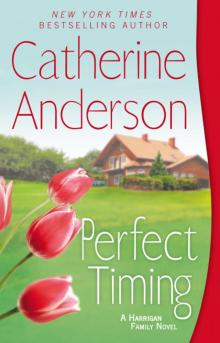 Perfect Timing
Perfect Timing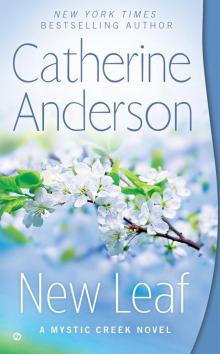 New Leaf
New Leaf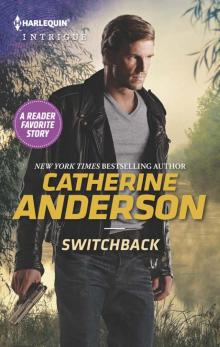 Switchback
Switchback Phantom Waltz
Phantom Waltz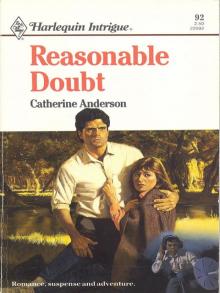 Resonable Doubt
Resonable Doubt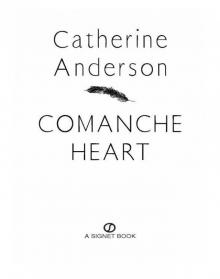 Comanche Heart
Comanche Heart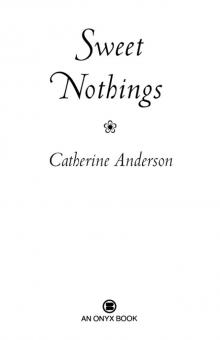 Sweet Nothings
Sweet Nothings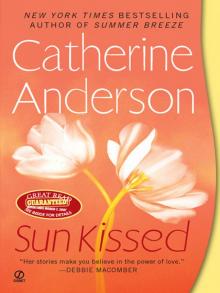 Sun Kissed
Sun Kissed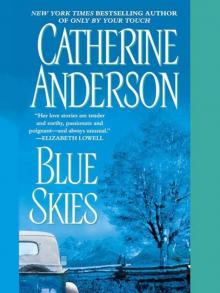 Blue Skies
Blue Skies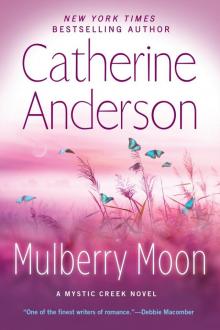 Mulberry Moon
Mulberry Moon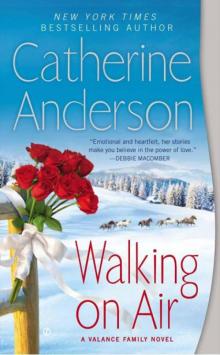 Walking on Air
Walking on Air Forever After
Forever After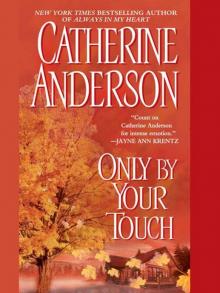 Only by Your Touch
Only by Your Touch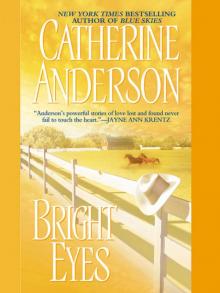 Bright Eyes
Bright Eyes Morning Light
Morning Light Indigo Blue
Indigo Blue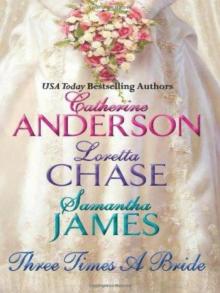 Fancy Free (Three Times a Bride Anthology)
Fancy Free (Three Times a Bride Anthology)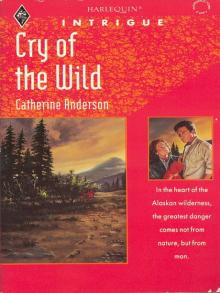 Cry of the Wild
Cry of the Wild Here to Stay
Here to Stay Star Bright
Star Bright The Christmas Room
The Christmas Room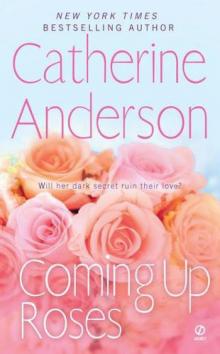 Coming Up Roses
Coming Up Roses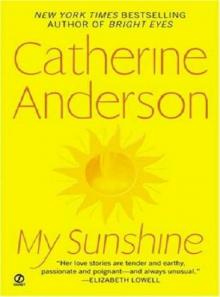 My Sunshine
My Sunshine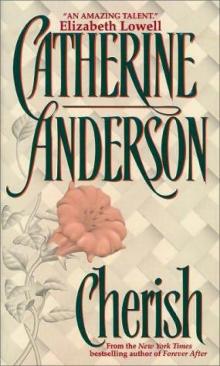 Cherish
Cherish Strawberry Hill
Strawberry Hill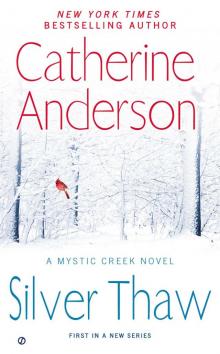 Silver Thaw
Silver Thaw Comanche Moon
Comanche Moon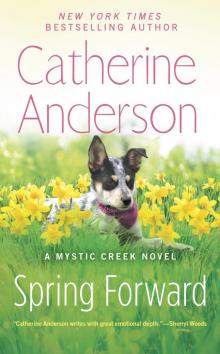 Spring Forward
Spring Forward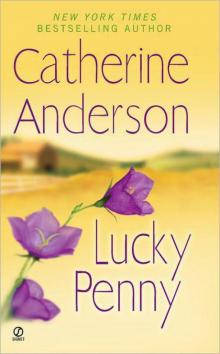 Lucky Penny
Lucky Penny Early Dawn
Early Dawn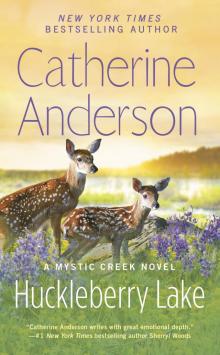 Huckleberry Lake
Huckleberry Lake Summer Breeze
Summer Breeze Without a Trace
Without a Trace Three Times a Bride
Three Times a Bride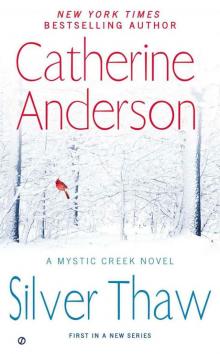 Silver Thaw: A Mystic Creek Novel
Silver Thaw: A Mystic Creek Novel